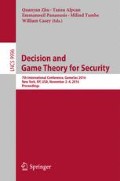Abstract
In this paper, we consider a Stackelberg security game (SSG) where a defender can simultaneously protect m out of n targets with \(n>m\) from an adversary that uses a quantal response (QR) to decide which target to attack. The main contribution consists in introducing risk aversion in the defender’s behavior by using an entropic risk measure. Our work extends the work in [20] to a model that considers a risk averse defender. In addition we improve the algorithms used in [20] by reducing the number of integer variables, outlining how this adapts to arbitrary linear constraints. Computational results are presented on large scale artificial instances, showing the qualitative advantages of using a risk measure rather than the expected value.
Access this chapter
Tax calculation will be finalised at checkout
Purchases are for personal use only
References
Camerer, C., Ho, T.-H., Chong, J.-K.: A cognitive hierarchy model of games. Q. J. Econ. 119(3), 861–898 (2004)
CPLEX. V12. 1: User Manual for CPLEX (2009)
Dantzig, G.B.: Linear Programming and Extensions. Princeton University Press, Princeton (1963)
Gilbert, E.: Gray codes and paths on the n-Cube. Bell Syst. Tech. J. 37(3), 815–826 (1958)
Haile, P., Hortaçsu, A., Kosenok, G.: On the empirical content of quantal response equilibrium. Am. Econ. Rev. 98(1), 180–200 (2008)
HSL. A collection of fortran codes for large-scale scientific computation. http://www.hsl.rl.ac.uk/
Kiekintveld, C., Jain, M., Tsai, J., Pita, J., Ordóñez, F., Tambe, M.: Computing optimal randomized resource allocations for massive security games. In: Proceedings of the 8th AAMAS Conference, Budapest, Hungary, vol. 1, pp. 689–696. International Foundation for AAMAS (2009)
Knuth, D.E.: The Art of Computer Programming: Sorting and Searching, vol. 3. Pearson Education, Upper Saddle River (1998)
McKelvey, R., Palfrey, T.: Quantal response equilibria for normal form games. Games Econ. Behav. 10(1), 6–38 (1995)
Pirnay, H., Lopez-Negrete, R., Biegler, L.: Optimal sensitivity based on IPOPT. Math. Program. Comput. 4(4), 307–331 (2012)
Pita, J., Jain, M., Marecki, J., Ordóñez, F., Portway, C., Tambe, M., Western, C., Paruchuri, P., Kraus, S.: Deployed armor protection, the application of a game theoretic model for security at the los angeles international airport. In: Proceedings of the 7th AAMAS: Industrial Track, Cascais Miragem, Portugal, pp. 125–132. International Foundation for AAMAS (2008)
Pita, J., Jain, M., Ordóñez, F., Tambe, M., Kraus, S.: Solving stackelberg games in the real-world: addressing bounded rationality and limited observations in human preference models. Artif. Intell. J. 174(15), 1142–1171 (2010)
Pratt, J.W.: Risk aversion in the small and in the large. Econometrica J. Econ. Soc. 32(1/2), 122–136 (1964)
Stahl, D., Wilson, P.: Experimental evidence on players’ models of other players. J. Econ. Behav. Organ. 25(3), 309–327 (1994)
Vielma, J.: Mixed integer linear programming formulation techniques. SIAM Rev. 57, 3–57 (2015)
Von Stackelberg, H.: The Theory of the Market Economy. William Hodge, London (1952)
Wachter, A., Biegler, L.: On the implementation of a primal-dual interior point filter line search algorithm for large-scale nonlinear programming. Math. Program. 106(1), 25–57 (2006)
Wright, J., Leyton-Brown, K., Beyond equilibrium: predicting human behavior in normal-form games. In: Proceedings of the 24th AAAI Conference on Artificial Intelligence, Atlanta, GA (2010)
Yang, R., Kiekintveld, C., Ordóñez, F., Tambe, M., John, R.: Improving resource allocation strategy against human adversaries in security games. In: 22th IJCAI Proceedings, Barcelona, Spain, vol. 22, pp. 458–464. AAAI Press (2011)
Yang, R., Ordóñez, F., Tambe, M.: Computing optimal strategy against quantal response in security games. In: Proceedings of the 11th AAMAS, Valencia, Spain, vol. 2, pp. 847–854. International Foundation for AAMAS (2012)
Acknowledgments
Funded by Conicyt through grant FONDEF No. D10I1002.
Author information
Authors and Affiliations
Corresponding author
Editor information
Editors and Affiliations
Rights and permissions
Copyright information
© 2016 Springer International Publishing AG
About this paper
Cite this paper
Chicoisne, R., Ordóñez, F. (2016). Risk Averse Stackelberg Security Games with Quantal Response. In: Zhu, Q., Alpcan, T., Panaousis, E., Tambe, M., Casey, W. (eds) Decision and Game Theory for Security. GameSec 2016. Lecture Notes in Computer Science(), vol 9996. Springer, Cham. https://doi.org/10.1007/978-3-319-47413-7_5
Download citation
DOI: https://doi.org/10.1007/978-3-319-47413-7_5
Published:
Publisher Name: Springer, Cham
Print ISBN: 978-3-319-47412-0
Online ISBN: 978-3-319-47413-7
eBook Packages: Computer ScienceComputer Science (R0)

